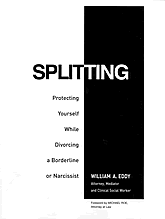I received a call from another attorney, who is out of state, with questions about Parental Alienation. He has a case in which he represents a targeted parent, in this case a Mom who, despite having sole cusody of her child, has now seen the child refuse to visit with her or live with her. The court’s initial reaction was “kids vote with their feet.” The Child Rep in that case has no understanding of PA, and has told the attorney that he believes the Father to be innocent of wrongdoing, does not see ho this charming man can be causing this, and it must be a relationship problem between Mom and the child. I walked my distant colleague through some strategies, and discussed with him my methodologies for managing cases with alienation. At the end of the conversation, he was very thanksful and both of us omindful as to how challenging these cases can be.
I reminded him as well that it is my belief that Parental Alienation is a form of child abuse.
Below is an excert from a solid article from Dr. Michael Bone, with whom I have worked on a case in Florida soem years ago. I was asked by a Jacksonville, Florida lawyer to co-counsel with her on a very challenging case involving psychological issues and Parental Alienation. Dr. Bone was retained as a consulting expert, and did exemplary work on the case.
Any attempt at alienating the children from the other parent should be seen as a direct and willful violation of one of the prime duties of parenthood.
|
Criteria I: Access and Contact Blocking
Criteria I involves the active blocking of access or contact between the child and the absent parent.
Criteria II: Unfounded Abuse Allegations
The second criteria is related to false or unfounded accusations of abuse against the absent parent.
Criteria III: Deterioration in Relationship Since Separation
The third of the criteria necessary for the detection of PAS is probably the least described or identified, but critically is one of the most important. It has to do with the existence of a positive relationship between the minor children and the now absent or nonresidential parent, prior to the marital separation; and a substantial deterioration, of it since then.
Criteria IV: Intense Fear Reaction by Children
The fourth criteria necessary for the detection of PAS is admittedly more psychological than the first three. It refers to an obvious fear reaction on the part of the children, of displeasing or disagreeing with the potentially alienating parent in regard to the absent or potential target parent. Simply put, an alienating parent operates by the adage, “My way or the highway.” If the children disobey this directive, especially in expressing positive approval of the absent parent, the consequences can be very serious. It is not uncommon for an alienating parent to reject the child(ren), often telling him or her that they should go live with the target parent. When this does occur one often sees that this threat is not carried out, yet it operates more as a message of constant warning. The child, in effect, is put into a position of being the alienating parent’s “agent” and is continually being put through various loyalty tests. The important issue here is that the alienating patent thus forces the child to choose parents. This, of course, is in direct opposition to a child’s emotional well being.
See: http://www.fact.on.ca/Info/pas

 Illinois Divorce Lawyer Blog
Illinois Divorce Lawyer Blog

